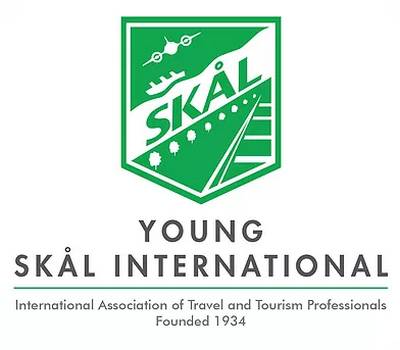Young Skål
What is Young Skål?
1. What is Young Skål?
Young Skål is a category of Skål International specially for students and young professionals directly related to the travel and tourism industry.
2. Who is eligible for membership?
Young Skål is open to all young professionals training for or working in the industry who are at least 20 years of age and not older than 29 years, who have been in the industry for a minimum of two years.
3. Why should Clubs recruit Young Skål members?
The idea behind Young Skål is to ensure that Clubs attract new and young professionals training for or working in the industry who, when qualified, will automatically graduate to Active membership, thus ensuring a continuous supply of new and younger members.

Young Skål: The Future of Skål
Young Skål Groups were set up by Skål International in 1999 with the aim of creating a greater awareness of Skål International by those young people studying for or training in the various sectors of the travel and tourism industry.
At the time of creation, the definition of Young Skål and its relationship to Skål International was given as follows:
Young Skål is a student or young professional non-profit making organisation which is directly related to the hotel, tourism, leisure and passenger transport industry. Young Skål is a restricted Skål International category and as such Group members are not entitled to full Skål International membership or to hold office or vote in the sponsoring Club or at any level in Skål International.
Group members can only attend national or international congresses or meetings as an accompanying person of an active or life member of Skål International or if specifically invited.
The requirements to become a Young Skål member are:
• To be a student at an authorised educational establishment which grants a degree or recognised diploma upon completion of studies.
• To be a young professional training for or working in the industry.
• To be at least 18 years of age and not older than 29.
The Objectives of Young Skål agreed were the following:
• To develop friendship and common purpose between the students of the educational establishment, by participating in areas related to the tourism industry, but also in cultural, sports, travel and public relations activities.
• To encourage and assist in the tourism education or experience of the members by participating in Skål activities and meeting Skål members
• To cooperate voluntarily in all Skål activities and the organisation set up by the sponsoring Club.
• To promote training opportunities for its members and to acquire professional experience with the support of the local Skål Club.
• To ensure that its members are fully aware of Skål, locally, nationally and internationally.
• To participate in an international network of Young Skål Groups.
 The first Clubs were established in 1999. A number of them worked well and others not so well. Some were happy to stay closely connected to the local Skål Clubs and others felt that they should have a life of their own. Some were happy to be involved with the local Club and others felt that the age gap in certain cases was too great. Another problem which arose that some Young Skål Groups consisted mainly of a particular class in a tourism school and when term ended they went in all directions looking for experience and left the Group devoid of members and trying to establish a Group all over again. There was also a difficulty in getting membership fees paid due to the transient nature of the Groups.
The first Clubs were established in 1999. A number of them worked well and others not so well. Some were happy to stay closely connected to the local Skål Clubs and others felt that they should have a life of their own. Some were happy to be involved with the local Club and others felt that the age gap in certain cases was too great. Another problem which arose that some Young Skål Groups consisted mainly of a particular class in a tourism school and when term ended they went in all directions looking for experience and left the Group devoid of members and trying to establish a Group all over again. There was also a difficulty in getting membership fees paid due to the transient nature of the Groups.
It was clear to the Executive Committee that while the principal of Young Skål was good, in practice it was not working as it should. The Executive Committee therefore took the project back to the drawing board and in Durban in 2004 it was agreed that a new category of Young Skål within Skål International would be created. The Objectives of Young Skål remain the same as outlined earlier in the document above The principal differences to the original project are the following:
Young Skål Groups have been incorporated into the local Skål Clubs in a special category which has been created.
• No minimum number necessary
• Easier for local Skål Clubs to recruit young people studying for or training in the industry
• Young Skål members are members of the local Club and dues are collected in the normal way. Young Skål international membership fee remains at 30 CHF
• Young Skål should be represented on the board of the local Skål Club as observers. Young Skål members automatically have all the benefits of Active membership through the Skål International website.
• Minimum age for admission to Young Skål raised to 20 years
• Maximum age extended from 29 years to 35 years. Those Young Skål members who have reached 29 years of age may continue as members in a Young Skål Associate membership category until the age of 35 years.
• At 35 years of age, if not eligible for Active membership, they must leave the Club.
• Clubs may transfer Young Skål members who qualify to Active membership at any time, once eligibility has been established.
• Young Skål members may attend Skål World Congresses availing themselves of possible special discounts at the discretion of the host Club.
Young Skål members who leave the training institute and do not enter the industry or if employed depart from an industry position would cease to be eligible for membership. Skål cares about young professionals and students in tourism and, as mentioned above, has created a special category in order for them to be able to join Skål. Many Clubs provide scholarships for students in tourism. Young people are bringing to Skål their innovative power and they will benefit from the experience of the active members who may become prospective employers. In the hard competitive world, as Skål embraces all sectors of the tourism industry, it can act as an oasis free of competition, where they can find protection and support and they might even meet their mentors!
Skål Clubs should take care when selecting Young Skål members to ensure that the management intentions and potential are clearly evident to avoid situations whereby Young Skål members have to leave the Club at the age of 35 because they are not eligible for Active membership.
To facilitate the international connection which Young Skål members can have by being members of the local Skål Club, an adjustment will be made to the Skål International website, “members only“ area so that all Young Skål members can be selected by country, thus enabling a greater international networking opportunity between them.
Finally, returning to the reason for Young Skål, Clubs should be fully aware that the principle is to create a greater awareness of Skål among young people studying for or training in the industry and to make Active membership in Skål a natural progression. Like Skål members, Young Skål members should be encouraged to use the “member get member” approach to increase membership in their Club.
